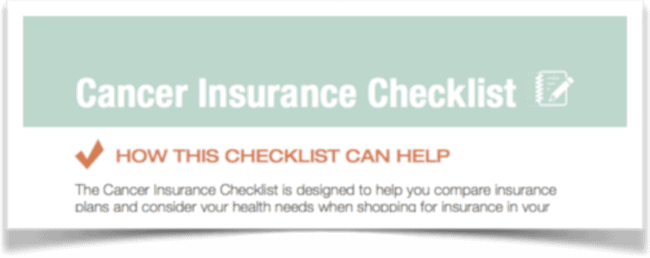
Being diagnosed with cancer is absolutely devastating.
No one wants to imagine themselves in such a situation, but if you were to be faced with a cancer diagnosis, you can probably understand the massive relief you’ll feel knowing that your associated medical bills will be taken care of.
Cancer insurance can help take one more thing off your mind, but you probably have a lot of questions that need answered before you can get a cancer insurance policy.
You’re looking for answers that will help you make an informed educated decision on a cancer insurance policy.
That’s exactly what I am going to share with you in this post: Practical cancer insurance information that you can use to protect yourself, just in case.
What does a cancer insurance policy cover?
It’s hard to know how much cancer treatment can cost.
Lump sum cancer insurance can help you get back on your feet and cover the cost of treatment.
Typically, the benefit amount ranges from $5,000 to $100,000 depending on the coverage you choose.
The benefit will be paid in cash if you face a cancer diagnosis.
The money can be used to pay deductibles/coinsurance, prescription drugs, rehabilitation, extended hospital stays, and for experimental therapy.
Most policies will also allow you to add on more benefits (for an additional premium), including recurrence coverage in case you receive a subsequent cancer diagnosis.
Most plans also offer Heart Attack and Stroke insurance along with other riders, and wikipedia provides an overview of coverage benefits as well.
How Is Cancer Insurance Different Than Health Insurance?

A cancer insurance policy is not meant to replace health insurance, it is meant to supplement it.
Cancer Insurance can also cover outside expenses in addition to medical bills.
The money is paid directly to the policy holder (typically tax free) to be used however is needed.
Unlike health insurance which benefits are paid directly to the provider.
Example 1: Let’s say you want to have some sort of experimental treatment done. Health Insurance typically does not cover it and you have to come out of pocket with it. Cancer insurance will cover something like this, along with other non-medical related expenses that you can occur.
Example 2: Let’s say you are out of work during treatment and you have a disability policy that pays 60% of your expenses. You can use the cancer insurance policy to help cover the other 40%.
Nancy Byrum says “It eases my mind a lot on some of my expenses,” she says, noting that helps her focus on getting better. “I may not be able to work full-time, and that will really help out paying my bills.”
You always want to check with our insurance provider to see exactly what your specific policy covers.
Is cancer treatment covered by insurance?
Health insurance policies vary, but the surprising majority of them actually won’t cover cancer treatments–or will quickly cap out, leaving you to foot the bill during an already stressful time.
It’s best to review your insurance policy to see, paying close attention to these four things:
- Co-Pays: This what you’re charged for specific services, like a doctor or hospital visit, lab visit, and tests like X-rays and scans. You may also be charged a co-pay for drugs and medications.
- Coinsurance: This it the % of cost that a patient will pay. Many policies are 80/20, which means you’ll be expected to pay 20% of the cost.
- Deductible: This plan is set up so the patient pays the full cost of all fees they incur until they meet the deductible (typically this resets annually). Some plans have it so some medical costs apply towards your deductible and others will not.
- Insurance cap: This is where cancer patients are often caught off guard. If your insurance policy places a cap on medical costs, once you reach this limit, the plan will not cover any more treatment costs. Some caps result annually and others are “lifetime caps”. Once you reach a lifetime cap, it’s like having no insurance at all.
How does a cancer policy work?

Cancer insurance is a supplemental form of health insurance coverage.
It will only pay out if you are diagnosed with cancer.
…and as Smart Asset says If you already have cancer, you will not be able to buy a plan.
Your family’s health history or lifestyle may also affect your eligibility and cost.
Most cancer insurance plans will pay out in a lump sum should you be diagnosed with cancer.
Some will also cover certain expenses in addition to that lump sum amount, but others are a one-time lump sum only and then your coverage ends.
If you want a larger lump sum, typically up to $100,000, your premium will be more expensive.
Premiums may also increase as you get older.
Can you buy life insurance if you have cancer?
The short answer: Yes. However, it can be difficult to find a life insurance policy if you have cancer already.
Certain insurance companies are willing to offer a graded death benefit life insurance policy for individuals with cancer.
These plans have payouts up to $25,000 (and sometimes more).
Many of these plans are limited by age, however.
If you are a cancer patient or if you are undergoing treatment, you will want to seek out a guaranteed issue life insurance policy.
Lump Sum Cancer Insurance
If you decide that cancer insurance is the right choice for you, lump sum cancer insurance is definitely what you should opt for.
Choosing your benefit, however, can prove to be a difficult decision.
With benefit options ranging widely from $5,000 to $100,000, asking yourself how much you need becomes a balancing act between the likelihood of a cancer diagnosis and the actual cost if you receive one.
If cancer runs in your family and/or if your lifestyle puts you at a greater risk for cancer, you should definitely consider a higher benefit
Of course, this will mean paying a higher premium.
On the other hand, if you are in good health and your family has no known history of cancer, and perhaps if you have a good financial cushion to help in such a situation anyway, you may choose to go with a lower benefit (and therefore: a lower premium).
Cancer Insurance Pros and Cons

Choosing whether or not to get cancer insurance requires a lot of thought.
It will depend on your health, your lifestyle, your family history (as VeryWellHealth emphasizes knowing your risk), and your financial situation.
While it will cost money to have a cancer insurance plan, could you afford treatments without one?
Is it worth it to you to pay for cancer insurance that, hopefully, will never be used?
- It provides peace of mind. Peace of mind is certainly one of the number one things that comes along with having a cancer insurance policy. When you have one, you can rest easy knowing you’ll be covered in the event that you do receive a cancer diagnosis.
- It can save you the stress. If you receive a cancer diagnosis, you will have to take time off work to receive the expensive treatments. Having a cancer insurance policy to cover these things can help reduce your stress in such a hard time of your life.
- You may never use it. Just like all forms of health insurance, you hope to never have to use your cancer insurance policy. This can mean you end up paying a lot of money for it, without ever cashing out on it. On the other hand, you may need it within a matter of months or years, which can save you large amounts of money in the long run.
Cancer Insurance Quotes

(The Cancer Support Community also provides a free Cancer Insurance Checklist to help you when shopping for insurance.)
Weigh your options and consider if a cancer insurance policy is a good fit for you.
If you are considering cancer insurance, it’s important that you get a quote from a reputable licensed agent.
When considering a cancer insurance policy, be sure to compare apples to apples.
What’s the premium going to be? What will your benefit be if you receive a diagnosis?
You should also read the fine print. How long will it take for your cash benefit to be paid out?
Are there any exceptions to the plan that may prevent you from receiving your cash benefit, or prevent you from receiving it in a timely manner?
These are all things you should ask a reputable agent directly.
Some other questions you should ask include:
- When will my coverage begin?
- After the lump sum payment, does coverage end or will this plan cover additional cancer-related expenses?
- What will happen as I get older? Will my premium increase?
- Do you offer a plan for my entire family? How will that premium change over time?
- Will my premium increase if I have a heart attack or stroke?
- Do you have any restrictions on how I can use the benefit money?
- Are there any restrictions on the doctors/hospitals I choose to use?
- What if I decide that I no longer want cancer insurance in the future, will I get a refund? Will there be charges for cancelling my plan?
CureToday goes over very similar points to consider in making your decision as well, written from a personal experience.
These questions will help you choose the right insurance company and policy that best suits you.
When looking for plans to compare, eSupplemental.com can help you find the right cancer insurance policy to fit your needs and your budget.
Here’s Your Next Step…
Are you looking for the best cancer insurance policy? That really depends on your specific situation and what is best for one person may not be best for another.
Click on the button below and fill out our free quote request form. One of our helpful agents will review and get back with you to go over your best options.

Leave a Reply